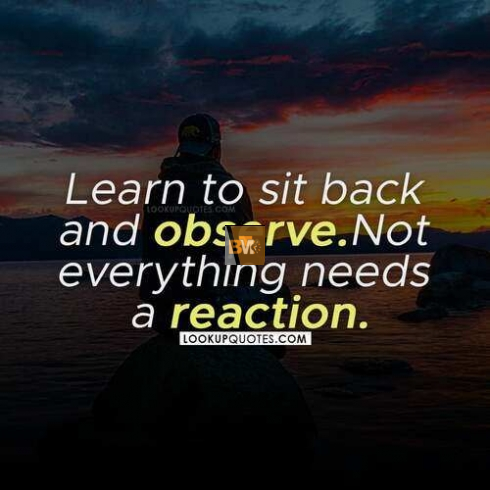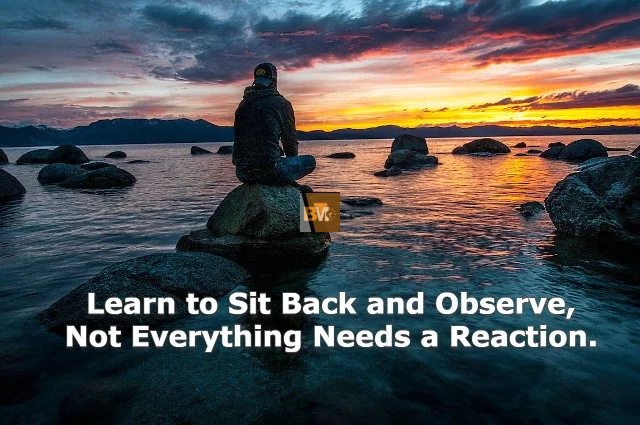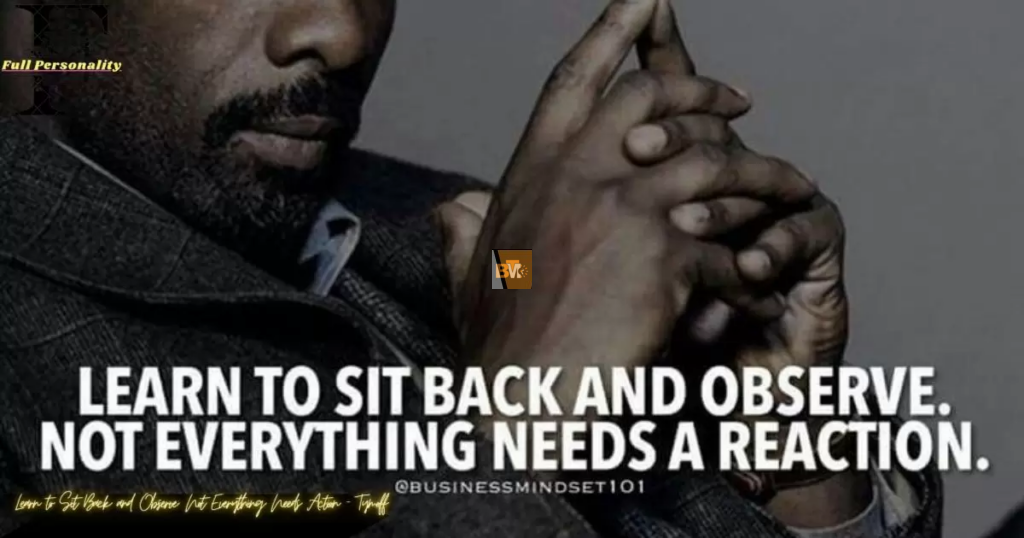In our fast-paced, always-on society, “sitting back and observing” can seem almost counterproductive. We’re conditioned to think that action equals progress and inaction is tantamount to failure. However, there’s a profound wisdom in the art of observation that has been echoed throughout history by philosophers, leaders, and thinkers alike. The phrase “learn to sit back and observe; not everything needs your immediate action,” credited to Tymoff, encapsulates this wisdom in a way that resonates deeply with modern challenges. This article explores the importance of observation, the benefits of restraint, and how we can integrate this approach into our lives for better decision-making and improved well-being.
The Wisdom in Observation
Understanding the Power of Observation
Observation is a skill often underestimated in its importance. It involves more than just seeing what is in front of us; it is about understanding and interpreting the deeper layers of what is happening around us. By sitting back and observing, we give ourselves the time and space to notice the subtleties of situations, the nuances in people’s behavior, and the underlying patterns that are not immediately apparent.
In the rush to act, we can easily overlook these details, leading to decisions based on incomplete or superficial information. Observation allows us to gather more data, consider various perspectives, and understand the context more fully before taking action. It’s about creating a mental map, identifying pitfalls, and predicting outcomes. This approach is strategic and reflective, helping us avoid hasty judgments and impulsive reactions.
The Historical Perspective: Observation as a Tool for Leaders
Throughout history, great leaders have emphasized the importance of observation. In “The Art of War,” Sun Tzu highlighted the importance of knowing both the enemy and oneself through careful observation and understanding. He believed that such knowledge was crucial to achieving victory without unnecessary conflict. Similarly, in his meditations, Roman Emperor Marcus Aurelius often reflected on the value of observing one’s thoughts and actions, stressing the importance of self-awareness and deliberate, thoughtful decision-making.

More recently, leaders like Mahatma Gandhi and Martin Luther King Jr. demonstrated the power of observation by choosing nonviolent resistance. They observed the social and political landscapes, understanding that restraint and patience could sometimes achieve more than immediate action. Their strategies were based on a deep understanding of human nature and power dynamics, honed through careful observation rather than impulsive action.
The Benefits of Restraint
Avoiding the Pitfalls of Impulsiveness
In today’s world, where information flows at an unprecedented speed and decisions are often expected in real time, the temptation to act quickly can be overwhelming. However, impulsive actions usually lead to unintended consequences. When we react without fully understanding the situation, we may overlook critical factors, misinterpret intentions, or escalate conflicts unnecessarily.
By practicing restraint and observing rather than immediately reacting, we allow ourselves to process information more thoroughly. It reduces the likelihood of making decisions based on incomplete data or emotional responses. It will enable us to weigh the pros and cons more effectively, consider alternative solutions, and anticipate the consequences of our actions more accurately.
Enhancing Emotional Intelligence
Observation is closely linked to emotional intelligence, particularly the ability to manage one’s emotions and understand the feelings of others. We can better identify and regulate our emotional responses when we sit back and observe. Instead of being driven by anger, frustration, or anxiety, we can approach situations with a calmer, more balanced mindset.
This emotional regulation is crucial in both personal and professional contexts. It helps prevent conflicts from escalating, fosters better communication, and leads to more constructive outcomes. Moreover, by observing others, we can develop a more profound empathy and understanding of their perspectives, which enhances our ability to build strong, positive relationships.
Applying the Principle of Observation in Daily Life
In Personal Relationships
In personal relationships, the ability to observe and restrain from immediate action can be transformative. Conflicts arise not from the issues themselves but from how we respond to them. By sitting back and observing, we can avoid knee-jerk reactions that might exacerbate tensions. Instead, we can take the time to understand the other person’s point of view, identify underlying issues, and address them calmly and constructively.
For example, in a disagreement with a partner or family member, an immediate reaction might lead to arguments or hurtful words that damage the relationship. However, by observing the situation, noticing both the verbal and non-verbal cues, and considering the broader context, we can respond in a way that fosters understanding and resolution rather than conflict.
In the Workplace
In the workplace, the ability to observe before acting can set influential leaders apart from the rest. Decisions made haste can lead to costly mistakes, strained relationships, and missed opportunities. On the other hand, leaders who take the time to observe their teams’ dynamics, understand their employees’ underlying motivations and consider the long-term implications of their decisions are more likely to achieve sustainable success.
Observation in the workplace also includes being attuned to the organizational culture, recognizing the unspoken rules, and understanding the informal networks that influence decision-making. By observing these elements, leaders can navigate the complexities of their organizations more effectively, build stronger teams, and create a more positive work environment.

In Personal Growth and Development
On a personal level, the practice of observation can be a powerful tool for self-growth. Observing our thoughts, emotions, and behaviors can give us deeper insights into ourselves. This self-awareness is the foundation of personal development, allowing us to identify areas for improvement, set meaningful goals, and make more deliberate choices.
For instance, by observing our habitual responses to stress, we can identify patterns that may be counterproductive, such as procrastination or avoidance. With this awareness, we can replace these habits with more constructive behaviors that contribute to our overall well-being.
The Role of Mindfulness in Observation
Integrating Mindfulness into Daily Life
Mindfulness is the practice of being fully present in the moment, and it is a crucial component of practical observation. By cultivating mindfulness, we enhance our ability to observe without judgment, allowing us to see situations more clearly and respond more thoughtfully.
Mindfulness can be integrated into daily life through simple practices such as mindful breathing, meditation, or taking a few moments each day to pause and reflect. These practices help to calm the mind, reduce stress, and improve focus, all of which are essential for practical observation.
The Benefits of Mindfulness
The benefits of mindfulness are well-documented. Studies have shown that mindfulness can reduce stress, improve mental clarity, and enhance emotional regulation. For observation purposes, mindfulness helps us stay focused on the present moment, reducing the influence of past experiences or future anxieties on our perceptions.
By practicing mindfulness, we can observe situations more objectively, free from the biases and judgments that often cloud our decision-making. This clarity allows us to respond more effectively to the challenges in our personal lives, careers, or interactions with others.
When Action is Necessary
Balancing Observation with Action
While sitting back and observing is invaluable, it is essential to recognize that there are times when action is necessary. The key is to find the right balance between observation and action. Observation should inform our actions, ensuring they are well-considered and practical rather than reactive and impulsive.

This balance can be achieved by setting clear intentions and goals. When we clearly understand what we want to achieve, we can use observation to guide our actions toward those goals. This approach allows us to act purposefully rather than being swayed by immediate circumstances or emotions.
Knowing When to Act
Knowing when to transition from observation to action is a skill that comes with experience and self-awareness. It involves recognizing the signs that indicate when a situation requires intervention and when it is better to wait and gather more information.
In some cases, immediate action may be necessary to prevent harm or seize an opportunity. In others, patience and further observation may yield better results. By honing our observational skills, we can develop the discernment needed to make these decisions more effectively.
Conclusion: The Art of Observation in a Busy World
Sitting back and observing is a powerful counterbalance in a world that often prioritizes speed and action. It allows us to navigate the complexities of life with greater clarity, make more informed decisions, and build stronger relationships. By embracing the wisdom of observation, we can learn to act not out of impulse but out of a deep understanding of our situations.
The phrase “learn to sit back and observe; not everything needs your immediate action” serves as a reminder that sometimes the best course of action is no action at all. Instead of rushing to fix, solve, or change things, we can take a step back, observe the situation, and allow the right course of action to reveal itself.
As we move forward, let us remember the power of observation. By cultivating this skill, we can enhance our emotional intelligence, improve our decision-making, and ultimately lead more fulfilling and successful lives. In a world that is constantly urging us to do more, the ability to observe may be one of the most valuable skills we can develop.






Leave a Reply